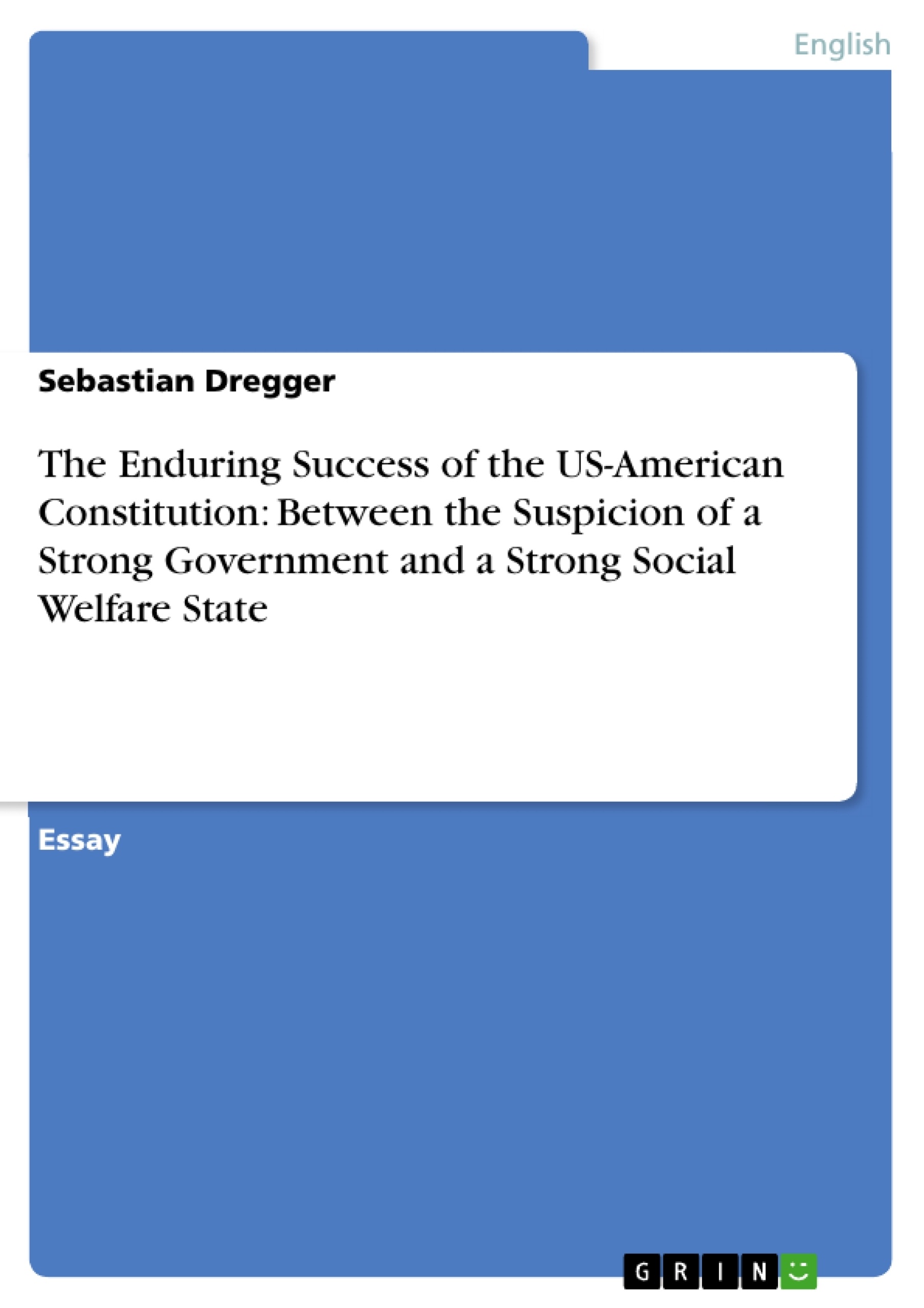When the seventy-four delegates of the thirteen founding states of America came together at the Pennsylvania State House in Philadelphia in 1787 to debate and draft a new constitution, they wanted to achieve two aims: On the one hand, they wanted to establish a successful and enduring federal government having the means to defend independence from European powers as well as to keep the states with their different interests together. On the other hand, knowing that authoritarian and corrupt monarchies oppressing their own people dominated the political world of the 18 th century, the constitution should be so carefully drafted that any government in future could be efficiently prevented from becoming too powerful and thus turning into a tyranny. 1
Many people in those days doubted if these two demanding aims could be equally achieved by the new constitution. They were of the opinion that tyrannical governments are the price to pay for a well-functioning and successful government. 2 However, the history of the American Constitution has proven these people wrong: even more than 200 years later the same constitution is still in power. And more than that: it has become the founding document of the first modern - functioning - democracy with the result that not only the American people - no matter to what political camp they belong as individuals - are proud of their constitution 3 ; many other states wanting to establish their own democracy have also tried and still try to imitate and adopt the features of the US- Constitution. 4 So, looking at the unique history of the American constitution, the question arises: What is it that has made this constitution so stable and successful?
In my essay I want to argue that two aspects are responsible for this success: On the one hand, the US- Constitution is marked by its incorporation of mechanisms through which the idea of a suspicion of a strong government is expressed in order to protect individual freedom. On the other hand, it is the constitution’s flexibility to adapt its general principles to new social conditions that have contributed to its success. The most important adaptation which took place in this context was that of the development of a social welfare state during the New-Deal-time which helped to master the worst economic crisis in American history. [...]
Inhaltsverzeichnis (Table of Contents)
- I. Introduction
- II. The suspicion of a strong government
- A. General idea
- B. Features of the American Constitution of 1787
- 1) A stronger federal government
- 2) Limitation of power
- III. The creation of a strong welfare state
- A. Need for a welfare state
- B. Features of the welfare state
- IV. Conclusion
- V. References
Zielsetzung und Themenschwerpunkte (Objectives and Key Themes)
This essay aims to explain the enduring success of the US Constitution. It argues that the constitution's success stems from two key aspects: the incorporation of mechanisms that express a suspicion of a strong government to protect individual freedom, and its flexibility to adapt to new social conditions.
- The influence of Enlightenment philosophy on the Founding Fathers
- The balance between a strong government and the protection of individual rights
- The role of the US Constitution in establishing a functioning democracy
- The development of a strong welfare state in the context of the New Deal era
- The adaptability of the US Constitution to evolving social conditions
Zusammenfassung der Kapitel (Chapter Summaries)
The introduction discusses the two main objectives of the Founding Fathers in drafting the US Constitution: establishing a strong federal government and preventing it from becoming tyrannical. The essay then explores the historical context of the American Constitution, referencing the influence of Enlightenment philosophy, particularly the ideas of John Locke. It highlights the failures of the Articles of Confederation and the lessons learned for the creation of the new constitution.
Chapter II focuses on the concept of suspicion of a strong government. It explains how this principle is rooted in Enlightenment philosophy and the importance of safeguarding individual rights. This chapter also examines the features of the American Constitution designed to limit government power, such as federalism, separation of powers, and checks and balances.
Chapter III explores the creation of a strong welfare state in the United States, particularly in the context of the New Deal era. It discusses the need for a welfare state and the features that characterize it. This chapter emphasizes the adaptability of the US Constitution in responding to social needs and economic crises.
Schlüsselwörter (Keywords)
Key concepts in this essay include the US Constitution, the Founding Fathers, Enlightenment philosophy, John Locke, individual rights, limited government, federalism, separation of powers, checks and balances, welfare state, New Deal, adaptability, and enduring success.
Frequently Asked Questions
Why has the US Constitution endured for over 200 years?
Its success is attributed to its balance between a strong federal government and mechanisms that prevent tyranny, combined with the flexibility to adapt to changing social conditions.
What were the two main aims of the Founding Fathers in 1787?
They aimed to establish a functional federal government capable of national defense and to prevent any future government from becoming too powerful or authoritarian.
How does the US Constitution limit government power?
It uses principles like federalism, the separation of powers into three branches, and a system of checks and balances to protect individual freedom.
What role did the New Deal play in the Constitution's history?
During the New Deal era, the Constitution proved flexible enough to allow for the development of a strong social welfare state to combat the Great Depression.
Which philosophers influenced the US Constitution?
Enlightenment thinkers, most notably John Locke, significantly influenced the Founding Fathers' ideas on individual rights and the role of government.
- Arbeit zitieren
- Sebastian Dregger (Autor:in), 2006, The Enduring Success of the US-American Constitution: Between the Suspicion of a Strong Government and a Strong Social Welfare State, München, GRIN Verlag, https://www.grin.com/document/63094



